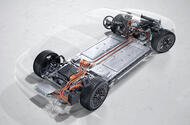Mercedes: electric car battery recycling won’t stop mining


New plant can recover enough material to build new batteries for 5000 electric cars annually
Batteries will still require mined material despite recycling gains at new Kuppenheim plant
Mercedes-Benz will always need to mine rare-earth materials to build electric car batteries, despite developments in battery recycling, according to the firm’s supply chain chief.
The company recently opened a new plant in Kuppenheim, Germany, that is said to be capable of recovering 96% of the raw materials from an existing EV’s battery pack. The plant will eventually yield 2500 tonnes of production-grade cobalt, copper, manganese, nickel and lithium a year – enough for around 5000 cars’ battery packs.
But Jörg Burzer, Mercedes board member for production, quality and supply chain management, has said battery recycling will never reach the point of total self-sufficiency. Burzer told Autocar: “I think we will always need 20%, 30% or 40% [of materials sourced using mining]. If recycling is in full swing somewhere in 2040, you still need a big portion of new materials coming from mines.”
This is despite the unusually high material recovery rate of the Kuppenheim plant. Its 96% is well above the 80% figure Mercedes claimed it would have achieved with traditional methods, such as smelting.
This is because Mercedes uses a hydrometallurgical process, in which an aqueous solution, rather than thermal energy, is used to separate the materials. The process takes around two days to complete and uses relatively little energy, with all power coming from a 350kW solar panel array on the Kuppenheim plant’s roof.
The process starts by checking a battery’s state of charge before it is fed into a shredder. The resultant debris is run through a mechanical ‘washer’ – effectively a giant sieve – before it is separated by magnets, vacuum-dried and then put through a ‘filter press’, which works like a coffee press.
This yields a ‘black mass’ of chemicals that is dissolved into a liquid solution and pressed to remove the graphite. The solution is neutralised using ammonia and hydrogen peroxide, and pressed again to remove the last traces of aluminium and iron.
Finally, it is treated with sulphuric acid, ammonia and an organic solvent, producing sulphates of copper, cobalt, manganese, nickel and lithium.
The copper, manganese and lithium are stored as liquids in huge drums, whereas the cobalt and nickel are crystallised before being recovered and re-used.
It will take around “three to four years” to hit the 2500-tonne annual yield, said Burzer. This is because there is currently a limited stock of end-of-life lithium-ion batteries, owing to the relative newness of Mercedes’ EVs. Its first mass-produced electric car, the EQC, was launched in 2018.
Burzer said: “You have to have a certain amount of batteries in the market before you can [start to] recycle them. So first you have to produce them, and this will be with raw material coming from mines, because you don’t have anything to recycle.“Our quality standard for our batteries is eight to 10 years, so there will be some delay. That means that for the next three, four or five years it works [at a lower capacity], but in parallel what is very important is that we understand the process and, more importantly, we understand the scalability.”
In the meantime, Kuppenheim will recycle batteries from Mercedes’ research and development efforts, as well as from prototype cars. Burzer said Mercedes is also open to taking in other manufacturers’ batteries, as well as looking at different chemistries.
“LFP [lithium iron phosphate] and NMC [nickel manganese cobalt] together, we could do that,” he said. “The question is: do you do them in batches or not? We have to think about efficiency.”
Source: Autocar RSS Feed
Recent Posts
Players’ body hits out at ‘confusing’ schedule and wants Nations League of cricket
World Cricketers’ Association calls for reform of calendarWCA also wants modernisation of global governing bodyThe…
Samsung’s Galaxy A36 and Galaxy A26 Both Offer Big, Bright Screens Under $500
The Galaxy A26 and A26 also run a truncated version of Samsung's AI magic called…
You Can Control the Newest Samsung TVs With a Flick of Your Wrist (And a Samsung Watch)
The loneliest round of Hokey Pokey.
Advertisers Finally Return to X in Effort to Cozy Up to Trump Administration
All it took was upending democracy to make a couple bucks.
Apple’s base iPad didn’t get AI, and this chart totally explains why
Apple just this month after a very long, 2+ year wait. But curiously, the new…
Doctor Who Reunites Christopher Eccleston and Billie Piper in New Audio Series
The duo are celebrating 20 years since their TARDIS debut.